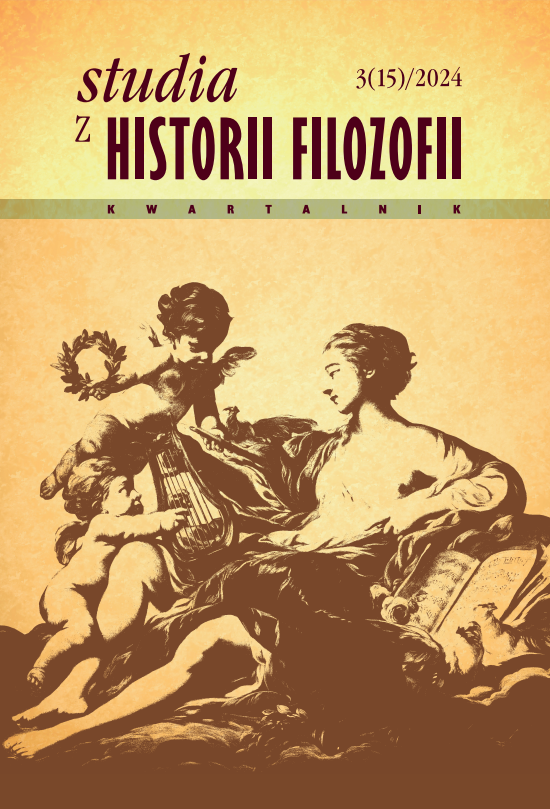The Ontological and Axiological Foundations of the Meaning of Human Life in Nicolai Hartmann's Philosophy
DOI:
https://doi.org/10.12775/szhf.2024.014Słowa kluczowe
meaning of life, values, personal spirit, objective spirit, teleology, meaningless, Nicolai HartmannAbstrakt
The subject of this article is Nicolai Hartmann's conception of the ontological and axiological foundations of the meaning of human life. Referring to both Hartmann's major and minor, I analyze his conception of human meaning in the dimension of individual life and in the historical dimension. I begin my discussion with a brief overview of Hartmann's relation to the earlier metaphysics of meaning. Then, I focus on identifying the ontological foundations of meaning. In this section, I specifically present Hartmann’s understanding of the laws of real being, his critique of ontological monism, and, of particular importance, his critique of teleological monism. I also reconstruct the most important elements of Hartmann’s conception of man as a spiritual being, comprising the personal spirit of the objective spirit and the objectified spirit. Another point of consideration is the question of the axiological basis of meaning. For Hartmann, humans construct their specific position in the world by introducing axiological criteria and axiological points of view into the real world. As Hartmann argues, man is the intermediary between ideal values and the real world. The final point of consideration is the problem of historical meaning.
Bibliografia
Baumgartner Hans Michael. 1982. “Unbedingtheit und Selbstbestimmung – Kritische Bemerkungen zum Verhältnis von Autonomie der Person und Autonomie der Werte in Nicolai Hartmanns Ethik”. In: Nicolai Hartmann 1882–1950,
ed. Alois J. Buch, 35–45. Bonn: Bouvier Verlag Herbert Grundmann.
Below Hedwig. 1966. Das Problem der Freiheit in Nicolai Hartmanns Ethik, Diss. Köln: Gouder und Hansen.
Dähler Jacinta M. 1952. Zur Freiheitslehre von Nicolai Hartmann. Freiburg in der Schweiz: Paulusdruckerei.
Harich Wolfgang. 2000. Nicolai Hartmann. Leben, Werk, Wirkung, ed. Martin Morgenstern. Würzburg: Verlag Königshausen & Neumann.
Hartmann Nicolai. 1926. Ethik. Berlin–Leipzig: Walter de Gruyter & Co.
Hartmann Nicolai. 1932. Ethics, Vol. 1–3, transl. Stanton Coit. London–New York: George Allen & Unwin – The MacMillan Company.
Hartmann Nicolai. 1933. Das Problem des geistigen Seins. Untersuchungen zur Grundlegung der Geschichtsphilosophie und der Geisteswissenschaften. Berlin–Leipzig: Walter de Gruyter & Co.
Hartmann Nicolai. 1935. Ethik, 2nd ed. Berlin–Leipzig: Walter de Gruyter & Co.
Hartmann Nicolai. 1940. Der Aufbau der realen Welt. Grundriβ der allgemeinen Kategorienlehre. Berlin: Walter de Gruyter & Co.
Hartmann Nicolai. 1942. “Neue Wege der Ontologie”. In: Systematische Philosophie, ed. Nicolai Hartmann, 199–311. Stuttgart–Berlin: W. Kohlhammer Verlag.
Hartmann Nicolai. 1949. Grundzüge einer Metaphysik der Erkenntnis, 4th ed. Berlin: Walter de Gruyter & Co.
Hartmann Nicolai. 1953. New Ways of Ontology, transl. Reinhard C. Kuhn. Chicago: Henry Regnery Company.
Hartmann Nicolai. 1954. Einführung in die Philosophie. Vorlesungnachschrift. Überarbeitete, vom Verfasser genehmigte Nachschrift der Vorlesung im Sommersemester 1949 in Göttingen, 3rd ed. Osnabrück: Luise Hanckel Verlag.
Hartmann Nicolai. 1955. ”Naturphilosophie und Anthropologie”. In: Nicolai Hartmann, Kleinere Schriften. Vol. 1: Abhandlungen zur systematischen Philosophie, 214–244. Berlin: Walter de Gruyter & Co.
Hartmann Nicolai. 1955. “Sinngebung und Sinnerfüllung”. In: Nicolai Hartmann, Kleinere Schriften. Vol. 1: Abhandlungen zur systematischen Philosophie, 245–279. Berlin: Walter de Gruyter & Co.
Hartmann Nicolai. 1955. “Systematische Selbstdarstellung”. In: Nicolai Hartmann, Kleinere Schriften. Vol. 1: Abhandlungen zur systematischen Philosophie, 1–51. Berlin: Walter de Gruyter & Co.
Hartmann Nicolai. 1955. “Vom Wesen sittlicher Forderungen”. In: Nicolai Hartmann, Kleinere Schriften. Vol. 1: Abhandlungen zur systematischen Philosophie, 279–311. Berlin: Walter de Gruyter & Co.
Hartmann Nicolai. 1958. “Das Wertproblem in der Philosophie der Gegenwart”. In: Nicolai Hartmann, Kleinere Schriften. Vol. 3: Vom Neukantianismus zur Ontologie, 327–332. Berlin: Walter de Gruyter & Co.
Hartmann Nicolai. 1958. “Kants Metaphysik der Sitten und die Ethik unserer Tage”. In: Nicolai Hartmann, Kleinere Schriften. Vol. 3: Vom Neukantianismus zur Ontologie, 345–350. Berlin: Walter de Gruyter & Co.
Hartmann Nicolai. 1965. Zur Grundlegung der Ontologie, 4th ed. Berlin: Walter de Gruyter & Co.
Hartmann Nicolai. 1966. Ästhetik, 2nd ed. Berlin: Walter de Gruyter & Co.
Hartmann Nicolai. 2019. Ontology: Laying the Foundations, transl. Keith R. Peterson. Berlin–Boston: Walter de Gruyter
Hartmann Nicolai. 2014. Aesthetics, transl. Eugene Kelly. Berlin–Boston: Walter de
Gruyter GmbH.
Kant Immanuel. 1973. “Idea for a Universal History from Cosmopolitan Point of View”, transl. Lewis White Beck. In: Immanuel Kant, On History, ed. Lewis White Beck, 11–26. Indianapolis: Bobbs-Merril.
Kopciuch Leszek. 2007. Człowiek i historia u Nicolaia Hartmanna. Lublin: Wydawnictwo UMCS.
Kopciuch Leszek. 2008. “O różnicy w budowie dzieła sztuki u R. Ingardena i N. Hartmanna (w sprawie zarzutów Ingardena względem N. Hartmanna)”. Kwartalnik Filozoficzny 36(2): 101–114.
Kopciuch Leszek. 2010. Wolność a wartości: Max Scheler, Nicolai Hartmann, Dietrich von Hildebrand, Hans Reiner. Lublin: Wydawnictwo UMCS.
Kopciuch Leszek. 2013. “Nicolaia Hartmanna koncepcja ducha zobiektywizowanego i jej główna trudność”. Idea. Studia nad strukturą i rozwojem pojęć filozoficznych 25: 95–106. https://doi.org.10.15290/idea.2013.25.05.
Kopciuch Leszek. 2014. Szkice systematyczne z filozofii dziejów. Lublin: Wydawnictwo UMCS.
Kopciuch Leszek. 2015. Kryzysy, kreatywność i wartości. Lublin: Wydawnictwo UMCS.
Kopciuch Leszek. 2018. “Kreatywność antropologiczna”. Nauki o Wychowaniu. Studia interdyscyplinarne 2(7): 44–55; https://doi.org/10.18778/2450-4491.07.02.
Kopciuch Leszek. 2018. “Wprowadzenie do antropologii Nicolaia Hartmanna”. In: Uomo universale. Rozważania o człowieku, społeczeństwie i wartościach poświęcone pamięci Profesora Stanisława Jedynaka, ed. Jolanta Zdybel, Lech Zdybel, 155–168. Lublin: Wydawnictwo UMCS.
Kopciuch Leszek. 2020. Kreatywność a wartości. Lublin: Wydawnictwo UMCS.
Kopciuch Leszek. 2022. “Nicolai Hartmann’s Ethics. Feeling and Cognition of Values: Between Emotionalism and Rationalism”. Ruch Filozoficzny 77(3): 39–64; https://doi.org/10.12776/RF.2022.022.
Mayer Emmanuel P., O.F.M. 1952. Die Objektivität der Werterkenntnis bei Nicolai Hartmann. Maisenheim–Glan: Westkulturverlag Anton Hain.
Morgenstern Martin. 1992. Nicolai Hartmann. Grundlinien der wissenschaftlich orientierten Philosophie. Tübingen–Basel: Francke Verlag.
Pietras Alicja. 2019. “Prawa człowieka jako warunek możliwości wolności moralnej. Próba ontologicznej analizy wolności politycznej”. Kultura i Wartości 28: 131-164. http://dx.doi.org/10.17951/kw.2019.28.131-164.
Scheler Max. 1929. Mensch und Geschichte. Zürich: Verlag der Neuen Schweizer Rundschau.
Schlittmaier Anton. 1999. Zur Methodik und Systematik von Aporien: Untersuchungen zur Aporetik bei Nicolai Hartmann und Gottfried Martin. Würzburg: Königs- hausen & Neumann.
Pobrania
Opublikowane
Jak cytować
Numer
Dział
Licencja

Utwór dostępny jest na licencji Creative Commons Uznanie autorstwa – Bez utworów zależnych 4.0 Międzynarodowe.
Statystyki
Liczba wyświetleń i pobrań: 695
Liczba cytowań: 0



